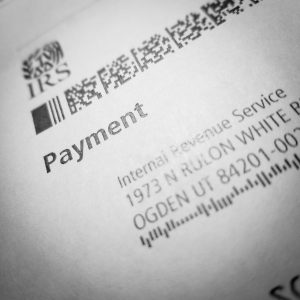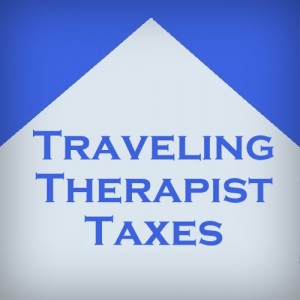Crunch time. Taxes are due very, very soon. No matter how much I work throughout the year to be prepared for tax season, it still takes hours to get everything organized when April rolls around. Don’t let me fool you, Kate’s the one who handles the finances around here – very smart of her. But, every year, I hope taxes will be painless, they never are. It is an awful, dreadful process, and being a traveling therapist does not help simplify the matter. I hope you’ve filed your taxes already, but if not, here are a few tips that will help make your tax season a little less painful:
Hire someone who specializes in taxes for travelers

An actual bill I received from the IRS in the middle of writing this very blog…. apparently we made a mistake two years ago. Whoops, my bad.
Having someone do my taxes who understands health care travelers and their financial arrangements is priceless – actually, it’s only $300. A traveler’s taxes are complicated. I work in multiple states each year, have a rental property in Maine, live in Colorado, occasional work as an independent contractor, and receive a lot of tax-free money each year. In my first years of travel, I tried using TurboTax, which charged me a lot of money for all the extra forms I needed. I also tried using someone at H&R Block – he said he could handle my taxes, but clearly had no idea what he was talking about when it came to travel stipends and reimbursements. Hiring a professional who can handle all the moving parts of travel therapy is money well spent.
A quick Google search will find a long list of people who specialize in taxes for travelers. Searching for “travel nurse tax preparation” yields the most results. A tax professional who specializes in travelers should also be able to help you answer all the questions you likely have about your tax home. A good tax-guy/gal should also be able to advise you of the things you can do in advance to help secure your tax home status in the event you are eventually audited. Speaking of which, make sure you ask any potential tax preparer what their responsibility is in the event you are audited. A few tax professionals warranty their preparations so that an audit is done on their time, others will charge you an hourly rate to defend your audit on their preparation.
Track your mileage
It’s easy, but few actually do it. Just keep a memo-pad in your glove box and write down any mileage that pertains to work – for 2016, you can deduct 54 cents for every mile you drive. It’s that simple.
Mileage you can include in your deduction:
- Mileage driving between assignments.
- Any driving between clinics or other work locations.
- In home care, all mileage between the office and patient visits can count towards your deduction.
- People living in permanent places commuting to permanent jobs are not allowed to deduct their commute mileage. However, because a travel work-place is temporary, I believe we are allowed to deduct the mileage on our commutes. That mileage can really add up! (You may want to see what your tax professional before committing to this one.)
The exception to the above categories is if you are already reimbursed for your mileage, you cannot claim it as a deduction on your taxes. For example, if an agency reimburses you specifically for your mileage to relocate, you cannot then deduct that mileage from your taxes. Similarly, if you are paid per mile in home health (which I recommend you do negotiate into any home health contract), you cannot claim that mileage. Although, with a federal deduction of 54 cents per mile, if your job reimbursed you less than 54 cents you can claim the remainder. These little bits do add up to a deduction that could make difference over the course of a year.
Keep track of your tax deductible items throughout the year
We have a big envelope that we put receipts in throughout the year. We keep track of the costs of various trips, the price of continuing ed courses, the price for APTA membership, and anything else that could be tax deductible. Frequently we make notes right on the front of our large tax-envelop so when tax season rolls around we aren’t spending hours trying to find the prices we paid for deductible items – this is where the majority of tax-prep time goes in our household. If you can truly be disciplined and keep track of your work-related costs throughout the year, tax preparation is far less painful when tax day comes.
Keep your tax records available to you, wherever you are
We have a fire-resistant file box that always traveled with us. It had everything important in it including our old tax records. The firebox is really heavy, maybe 20 pounds when empty… 35 pounds when full. It never fit quite right behind the front seat of the car on roadtrips. It basically has always been a pain to manage.
In the age of online data, it makes much more sense to scan all of your tax documents into the computer and store them online. If you ever have your taxes questioned in the future, you’ll be glad you have a readily accessible copy of your tax return. There is nothing worse than receiving an unexpected bill or audit from the IRS and having your tax returns back home, hundreds of miles away. When you need proof of your returns, you want it quickly. The general rule is to keep tax records for 7 years, but if it’s all online, I see no downside to keeping them longer… indefinitely.
Good luck, may this tax season be easy on you!


 Traveling Therapist: My wife and I traveled for a while but then had accepted permanent jobs, we are considering the traveling therapist life again and this brought up some questions in our minds. We are currently renting in Kansas, but when we go to travel again, we are trying to figure out what we need to do as far as claiming a tax home. I was originally living in my parents’ retirement house in Florida and was paying rent to them. My concern is that I might not have a place to claim as my tax home when we go back to traveling. Have you bought a house? What is the best way for us to claim a tax home?
Traveling Therapist: My wife and I traveled for a while but then had accepted permanent jobs, we are considering the traveling therapist life again and this brought up some questions in our minds. We are currently renting in Kansas, but when we go to travel again, we are trying to figure out what we need to do as far as claiming a tax home. I was originally living in my parents’ retirement house in Florida and was paying rent to them. My concern is that I might not have a place to claim as my tax home when we go back to traveling. Have you bought a house? What is the best way for us to claim a tax home?